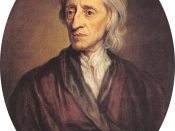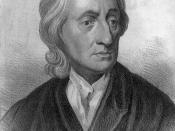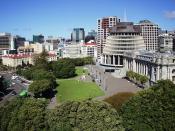Locke believed that it is the natural right of all people to be free. Unfortunately, in a state of nature, the weak become deprived of their rights by the brutish. Locke states that government is necessary to protect the life and property of ordinary citizens, only because without it, the people cannot be free. Locke also advocated a strong set of checks and balances. He believed that the citizens themselves were the final set of checks and balances, and that it was their obligation to overthrow a government that was not protecting its people. He goes on to say that a government must be favorable towards the people, because they must willingly submit to it. If people are forced into a government, they will undoubted overthrow it. This argument carries foreword on to his discussion of the Legislative and Executive powers.
Locke's thoughts on the powers of the executive and legislative branches are very similar to those outlined in the constitution.
Locke believes that all people are born equally, and so although people in government technically have more power than the regular citizens, the citizens should have the power to remove them when they do not feel properly represented. The purpose of government is to protect the rights of citizens; therefore a government should never have arbitrary power over any of its citizens. He states that the executive branch is necessary to act as the second power in a state of nature. It must punish those that commit crimes against the law. It must punish these crimes fairly though, or else the people will take action against it. To manage the direction of the executive powers, Locke explains the Legislative powers. Locke declares that the legislative powers are necessary in order to create laws that are favorable to...


